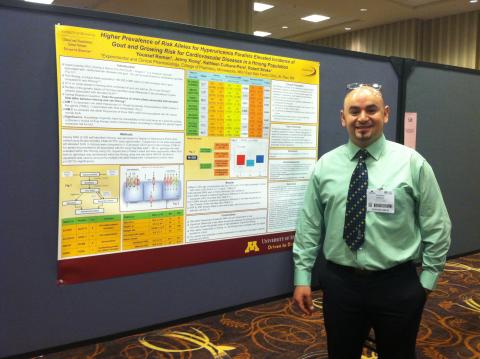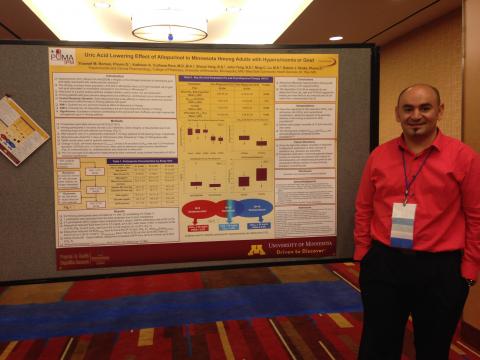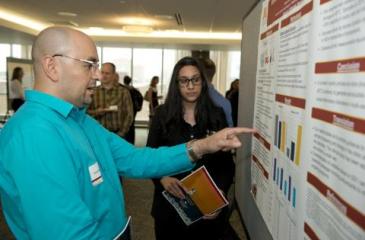CTSI is committed to training up-and-coming investigators so they can lead successful research careers, and uncover breakthroughs that can create a healthier tomorrow.
The institute’s career development programs help aspiring health researchers by providing funding, connecting them with collaborators, and creating educational experiences about all aspects of research. CTSI scholars attend seminars, participate in exercises designed to develop their skills, and get hands-on experiences by pursuing a mentored project.
The research training paved the way for one PhD candidate, who credits the CTSI program he joined as being the ‘turning point’ in his career.
Even though Youssef Roman, PharmD, is not quite out of school, he’s well on his way to becoming a successful researcher. His findings about metabolic disorders continue to be expanded upon, and he plays a key role in multiple studies, including one that’s federally funded by the Patient-Centered Outcomes Research Institute (PCORI).
“Joining a CTSI career development program was the turning point for me,” says Dr. Youssef Roman, a fourth-year PhD candidate in the University of Minnesota’s College of Pharmacy, who graduated from CTSI’s Advanced Pathways to Research Program (A-PReP), formerly the Advanced Research Program, in 2013. “CTSI opened the door to the studies I’m involved in now, and gave me the foundational skills, mindset, and experience to jumpstart my career in research.”
Research training that goes beyond what you learn in school
“CTSI’s career development program goes above and beyond what I learned in school, to give me in-depth research training and real-world experiences.”
The Clinical and Translational Science Institute’s Advanced Pathways to Research Program is designed for people with similar educational backgrounds and aspirations as Dr. Roman: Professional health sciences students who are pursuing a DDS, DNP, MD, PharmD, or, in some cases, a PhD, and are interested in research.
“CTSI’s career development program goes above and beyond what I learned in school, to give me in-depth research training and real-world experiences,” says Dr. Roman. “All of my research ‘firsts’ came through CTSI, from creating a poster to writing an abstract.”
Shaping the future of personalized medicine
The program enabled Dr. Roman to actively contribute to one of the most exciting and promising areas of health care: Personalized medicine. He explains:
“There’s so much to be learned about how people respond to medications because it’s largely influenced by our genes: the unique building blocks that make you you. If doctors can predict how an individual will respond to a treatment plan, they can personalize it to that individual, and prescribe the most effective drug and dosage. That’s the future I’m trying to create.”
For his A-PReP research project, Dr. Roman added to the personalized medicine knowledge base by trying to understand why Hmong Minnesotans are disproportionately affected by hyperuricemia, a metabolic disorder that causes gout, and is associated with cardiovascular, kidney, and renal diseases.
“CTSI’s career development program pushed me to articulate my research plan,” says Dr. Roman. “I learned how to build out the proposal, make the hypothesis, and identify the specific aim.”
Dr. Roman conducted the project under the guidance of his A-PReP mentor, Robert Straka, BSc, PharmD, FCCP, a professor and head of the College of Pharmacy’s Department of Experimental and Clinical Pharmacology. Dr. Straka is also Dr. Roman’s PhD advisor and encouraged him to apply to the program.
Dr. Roman’s research found that Hmong have a higher prevalence of the genetic variation associated with increased risk of having higher uric acid, which leads to gout. Findings were consistent with other published studies, including one that found gout to be two times more prevalent in Hmong, compared to non-Hmong communities.
Building on knowledge
The knowledge uncovered by Dr. Roman’s research continues to be built upon today.
He actively contributes to projects co-led by Dr. Straka and Dr. Kathleen Culhane-Pera, who jointly received a $65,000 CTSI Community Health Collaborative Grant and a $15,000 PCORI grant. These projects also strive to better understand hyperuricemia in Minnesota’s Hmong community.
While Dr. Roman’s research focused on a particular gene variant that may explain why the disease is more prevalent in Hmong communities, Drs. Straka and Culhane-Pera’s CTSI-supported research project aims to understand why they don’t respond as well to the kinds of drugs typically prescribed.
“Ultimately, we hope to help those who suffer from the disease get better, and prevent the onset of other serious conditions that seem to be associated with gout.”
By identifying the common identifiable genetic variations that contribute to drug response, they hope to help clinicians develop an individualized, genomic-based drug-selection strategy to reduce hyperuricemia and mitigate the consequence of related diseases.
“Gout, like other conditions that stem from hyperuricemia, is debilitating, painful, and often coexists with cardiovascular diseases,” says Dr. Roman. “Ultimately, we hope to help those who suffer from the disease get better, and prevent the onset of other serious conditions that seem to be associated with gout.”
Dr. Roman serves as the primary grad student on Drs. Straka and Culhane-Pera’s project team, where he supports data collection efforts; coordinates specimen (e.g., blood and DNA samples) processing, transfer, and storage; maintains data; and disseminates results.
He notes that, in doing this, he’s applying many of the skills he learned through A-PReP:
“CTSI’s career development program gave me skills that helped me contribute to the study protocol, facilitate the IRB submission process, manage study logistics, and support many other research activities.”
Partnering with the community
Engaging the community throughout the research process is central to the team’s approach. The study’s co-PI – Dr. Kathleen Culhane-Pera – is from Westside Community Health, a St. Paul-based health center that provides health care services to Hmong, Latinos, adolescents, immigrants and low-income communities.
To guide the project’s engagement with the community, the study’s co-PIs turn to the Hmong Genomics Board, which they established nearly 10 years ago. They also partner with a Westside Community Health clinic to recruit patients and draw blood.
“CTSI taught me how to approach research in a way that improves the health of our local communities,” says Dr. Roman. “By collaborating with community groups such as physicians, clinics, and nonprofits, researchers can better understand the needs of the people they’re trying to help, design culturally appropriate studies, and relay findings back to those who can benefit most.”

Beyond science
A-PReP also emphasizes the development of soft skills, so its scholars know how to effectively communicate and collaborate.
“CTSI’s career development programming went beyond scientific theories and statistics by teaching me how to convey complex scientific topics in a way that’s clear and compelling,” says Dr. Roman. “I developed, practiced, and refined the way I give presentations and connect with non-scientists, so people can understand what I’m researching and why it’s important.”
The program also stresses the importance of connecting and collaborating with other scientists. For example, through A-PReP, Dr. Roman began talking with a peer who was exploring the possibility of building a mobile app to help patients monitor for symptoms of hyperuricemia and properly take their medications.
“I never thought about how an app like this could help the same patients I work with,” says Dr. Roman. “This was a huge enlightenment, and showed me how a team that unites different perspectives, skill sets, and approaches has so much more potential than a single person.”
Since graduating A-PReP, Dr. Roman has submitted abstracts to national conferences, co-authored a book chapter on hypertension, and developed a manuscript that, as this goes to press, is currently under review at a journal. He has also been teaching at the College of Pharmacy. Dr. Straka has been there along the way to provide guidance and support.

“My A-PReP mentor and research collaborator, Dr. Straka, has been instrumental to advancing my research career,” says Dr. Roman. “The nature of our relationship is reflected in my own development as a research professional, and our accomplishments as collaborators, from publishing papers to securing funding.”
Dr. Roman continues to be involved in CTSI’s career development programs, and considers the programs’ scholars, faculty, and staff to be “like family”. Last summer he helped mentor an A-PReP scholar to fulfill a desire to pay it forward following his own valuable experience.
“CTSI’s career development program made me want to pursue a career in academic research,” says Dr. Roman. “I want to have the freedom and independence to ask untraditional questions and uncover answers that have the potential to create a healthier future for everyone. And CTSI gave me the foundational skills that will help me reach my goal.”
